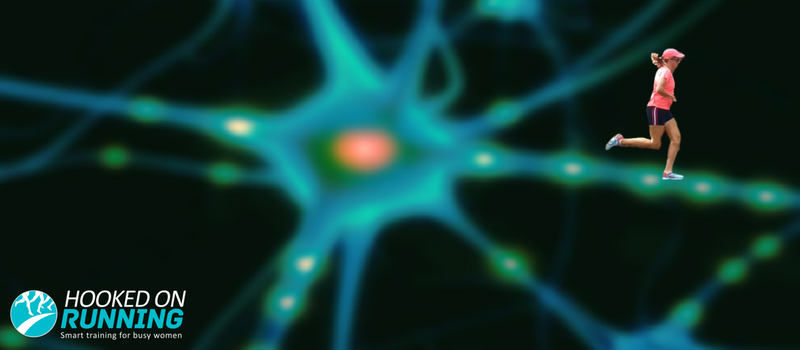Anyone who’s ever done regular physical exercise, whether that be running or something else, knows how good exercise can make you feel. But did you know that vigorous aerobic exercise actually triggers the birth of new neurons in the brain. And what’s more, to date, vigorous aerobic exercise is the only known trigger for the birth of new neurons!
Vigorous aerobic exercise such as running has been shown to have positive effects on the structure and function of the brain, namely generation of neurons in the hippocampus, the part of the brain important for learning and memory. By vigorous, I don’t mean flat out. You’re looking more at something that makes you puffed without feeling like you can’t continue.
Changes have also been seen in the frontal lobe of the brain of people who have been long term exercisers, with an increase in blood flow to this area. This is the part of the brain which is associated with clarity of thought – stuff like planning ahead, concentration, time management, goal setting and learning. This area is also linked to the regulation of emotion, hence, going for a run just seems to make you feel good.
Aerobic training more effective than HIIT and resistance training
A study by researchers at the University of Jyväskylä looked at the effect of sustained running exercise, high intensity interval training (HIIT) and resistance training on the production of neurons in adult male rats. The study also looked at groups of rats that had either a genetically high response to aerobic training, or a genetically low response to aerobic training. Groups of rats were put on an exercise program for 6-8 weeks, and a control group sat on the couch in their regular cage.
The highest number of new neurons in the hippocampus was found in the rats on the long distance training program, and who also had a genetic predisposition to benefit from aerobic exercise. Compared to the couch potato rats, the runners had 2-3 times more new neurons at the end of the experiment period. The body building group of rats who were put on a resistance training program showed no improvement in neurogenesis, and the HIIT group showed only minor improvement.
Marked cognitive decline in old age is not inevitable
The decline in our ability to think clearly is commonly considered to be a characteristic of aging. But not everyone experiences cognitive decline to the same degree. There are vast individual differences in the ability of the brain to function in old age. Could aerobic exercise be what’s allowing some people to maintain good cognitive function, whilst the brain function of others fades, sometimes dramatically?
A study published in the Journal of Gerontology in Nov 2006 randomly assigned older adults to an aerobic exercise group or a non aerobic exercise control group for six months. The subjects who participated in the exercise program had an increase in both grey and white brain matter mostly located in the regions of the brain which show substantial age-related deterioration ( the prefrontal and temporal cortices)
Neurons are found in the grey matter of specific brain regions, whilst white matter enables the communication between brain regions. They work together to enhance brain function, so the fact the aerobic exercise benefits both grey and white matter is the main reason it ranks so highly as a way to keep your brain young.
What’s going on inside your noggin to produce these changes?
Scientists at the Harvard Medical School isolated the specific molecule which improves cognitive function and protects against brain degeneration. The molecule, which has been named irisin, is produced in the brain during aerobic exercise through a chain reaction.
Firstly, a molecule called FNDC5 becomes elevated. Irisin is a byproduct of FNDC5. Increasing levels of irisin in the blood forces irsin to cross the blood brain barrier. That then increases the production of brain-derived neurotrophic factor (BDNF). Increasing levels of BDNF stimulates the growth of new neurons.
How much do you need to run to get the benefits?
Firstly, you probably don’t need to run. Any aerobic exercise of a moderate to intense nature will do it. One study conducted by Justin Rhodes at Oregon Health and Science University found that the BDNF concentration in mice increased by up to 171% after 7 nights of wheel running. Initially, the more running, the more BDNF, the greater the neurogenesis.
After a while, Rhodes found that his ultra-marathon mighty mice, who crazily ran all day and all night, eventually were unable to navigate a maze successfully. He found the best performing mice ran two to three miles a night. As they say, “everything in moderation”.
( I’m not sure what that equates to for humans, but in the course of trying to find out, I did discover that “mice miles” refers the amount of time one spends at a computer).
If you’re not already doing some at least moderate aerobic exercise, and you want to improve your thinking power, then start moving. Long easy runs, faster tempo runs, fartlek, interval training will all help to improve your brain power. (Note high intensity interval training -short bursts of all out effort, will do little to improve your cognitive function, but the the sub-maximal efforts more commonly part of a distance running program will)



 A while ago now I wrote a post entitle
A while ago now I wrote a post entitle